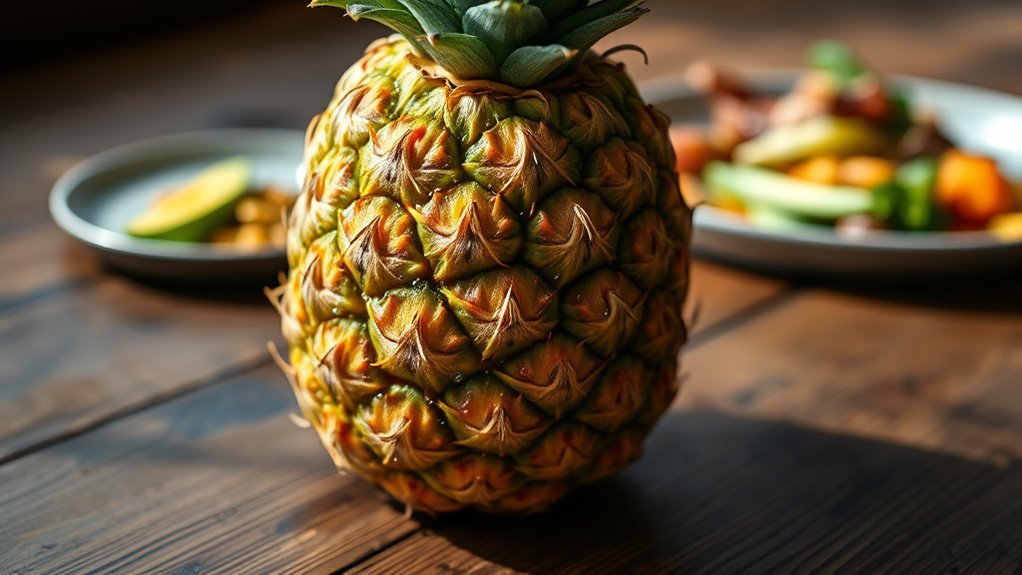Pineapple isn’t typically considered keto-friendly due to its high carbohydrate content. One cup of pineapple has about 22 grams of carbs, which can disrupt ketosis. It also has a glycemic index of 66, making it a poor choice for stable blood sugar levels. However, if you enjoy pineapple in moderation and pair it with healthy fats, you might still incorporate it into your diet. There’s more to explore about balancing fruits and fats on a ketogenic diet.
Understanding the Ketogenic Diet

When you immerse yourself in the ketogenic diet, you’ll find it’s more than just a low-carb eating plan; it’s a lifestyle change aimed at shifting your body’s primary energy source from carbohydrates to fats. The ketogenic principles focus on drastically reducing carbohydrate intake and increasing healthy fats, which encourages your body to enter a state known as ketosis. In this state, your body becomes efficient at burning fat for energy. This process is called fat adaptation, where your metabolism adjusts to utilizing fats instead of carbs. While adapting, you may experience initial challenges, but many people find increased energy and clarity once fully adjusted. Embracing these principles can provide you with the freedom to enjoy a varied diet while achieving your health goals.
Nutritional Profile of Pineapple

Exploring the nutritional profile of pineapple reveals why this tropical fruit often raises questions for those following a ketogenic diet. Pineapple is packed with essential vitamins, including vitamin C, which supports your immune system, and vitamin B6, essential for energy metabolism. It also contains important minerals like manganese and potassium, both of which play roles in bone health and muscle function. While these nutrients can contribute to your overall well-being, it’s important to evaluate how they fit within your dietary goals. Pineapple’s vibrant flavor and nutritional benefits might tempt you, but understanding its complete profile will help you make informed choices. Balancing enjoyment and dietary needs is key to maintaining your freedom while pursuing a keto lifestyle.
Carbohydrate Content in Pineapple

Although pineapple offers several health benefits, its carbohydrate content is a critical factor for those on a ketogenic diet. One cup of pineapple contains about 22 grams of carbohydrates, which can quickly take you over the daily limit for keto. If you’re seeking low-carb fruit alternatives, consider berries, avocados, or tomatoes, which typically contain fewer carbohydrates and can fit more easily into your meal plan. While pineapple is rich in vitamins and antioxidants, its high sugar content makes it a less favorable carbohydrate source for keto dieters. It’s crucial to balance your intake of fruits with your overall carbohydrate goals, so be mindful of how pineapple fits into your diet if you choose to include it.
Glycemic Index and Its Importance
Understanding the glycemic index (GI) is essential for anyone following a ketogenic diet, as it measures how quickly foods raise blood sugar levels. Foods with a high glycemic impact can spike your blood sugar, which isn’t ideal when you’re aiming for stable energy and fat-burning.
Here’s a quick look at GI values:
| Food Item | Glycemic Index |
|---|---|
| Pineapple | 66 |
| Broccoli | 15 |
| Almonds | 0 |
| Quinoa | 53 |
Knowing the GI helps you make informed choices, keeping your blood sugar levels steady. This insight is crucial for maintaining ketosis and achieving your health goals. So, consider the glycemic index when selecting foods on your keto journey.
How Pineapple Affects Ketosis
When you’re on a ketogenic diet, the impact of foods like pineapple on your body’s ability to maintain ketosis is essential to take into account. Pineapple, while delicious and rich in nutrients, is relatively high in carbohydrates. Consuming it in larger amounts can disrupt ketosis effects, as your body may revert to burning glucose instead of fat for fuel. However, pineapple benefits include vitamins, minerals, and antioxidants that can support overall health. If you crave the taste, consider smaller portions to enjoy the flavor while minimizing carb intake. Ultimately, being mindful of how pineapple fits into your daily macros can help you enjoy its advantages without compromising your ketogenic goals. Balance is key to maintaining freedom in your diet.
Portion Control: Enjoying Pineapple on Keto
When enjoying pineapple on a keto diet, portion control is key to managing your carb intake. Being aware of the carb count in even small servings can help you stay within your daily limits. Pairing pineapple with healthy fats can also enhance its flavor while keeping your meal balanced.
Serving Size Matters
Though you might be tempted to indulge in a generous serving of pineapple, it’s crucial to keep portion sizes in check when following a keto diet. Mindful eating is key here; by focusing on smaller servings, you can still enjoy the tropical flavor without compromising your carb goals. A typical serving size of pineapple is about half a cup, which can satisfy your craving while keeping your overall carb intake manageable. Remember, it’s all about balance. By practicing portion control, you can savor pineapple’s sweetness without derailing your keto journey. So, when you reach for that delicious fruit, consider measuring out your serving size to guarantee you’re enjoying it mindfully and staying within your dietary limits.
Carb Count Awareness
Understanding the carb count of pineapple is essential to maintaining your keto diet, especially since this tropical fruit can quickly contribute to your daily carbohydrate limit. A standard serving of pineapple contains about 21 grams of carbs, which can take a significant chunk out of your allowance. If you’re keen on carb counting, portion control becomes vital. You might consider enjoying small amounts of pineapple, perhaps as an occasional treat or mixed into keto snacks like yogurt or salads. Balancing your love for this fruit with your dietary goals is possible, but it requires mindfulness. By staying aware of the carb content, you can enjoy pineapple while still embracing the freedom of your keto lifestyle.
Pairing With Fats
To enjoy pineapple while sticking to your keto diet, pairing it with healthy fats can be an effective strategy. This not only enhances flavor balancing but also helps you stay within your carb limits. Here are three fat pairings you might consider:
- Coconut Cream: Rich in healthy fats, it complements pineapple’s sweetness beautifully.
- Avocado: Its creamy texture adds richness and provides essential nutrients without spiking your carbs.
- Nut Butters: Almond or macadamia nut butter can create a delicious dip that brings healthy fats to the mix.
Alternative Low-Carb Fruits
If you’re following a ketogenic diet and craving something sweet, there are plenty of alternative low-carb fruits you can enjoy without derailing your goals. Low carb berries, like strawberries, raspberries, and blackberries, are excellent choices due to their high fiber content and low sugar levels. A handful can satisfy your sweet tooth while keeping carbs in check. Additionally, keto-friendly melons such as cantaloupe and honeydew provide hydration and a rejuvenating taste with minimal carbs. You can mix these fruits into salads, smoothies, or enjoy them on their own. By choosing these low-carb options, you can indulge your cravings while adhering to your keto lifestyle, making it easier to stay on track without feeling restricted.
Health Benefits of Pineapple
Pineapple is packed with nutrients, providing vitamins and minerals that support overall health. Its anti-inflammatory properties can help reduce swelling and pain, making it a great addition to your diet. Additionally, the bromelain in pineapple aids digestion, promoting a healthier gut.
Nutrient Density Profile
Tropical fruit lovers often appreciate pineapple not just for its sweet, tangy flavor but also for its impressive nutrient density profile. This fruit packs a punch when it comes to vitamins and minerals, making it a delightful addition to your diet. Here are three standout benefits of pineapple’s nutrient content:
- Rich in Vitamin C: Pineapple is loaded with vitamin C, boosting your immune system and promoting skin health.
- Manganese Source: This mineral supports bone health and metabolism, making pineapple a valuable choice for overall wellness.
- Bromelain: An enzyme found in pineapple, bromelain aids digestion and has potential health benefits.
Anti-Inflammatory Properties
While many fruits offer health benefits, pineapple stands out for its notable anti-inflammatory properties, largely attributed to the enzyme bromelain. This powerful enzyme acts as an anti-inflammatory agent, helping to reduce swelling and pain in conditions like arthritis and sinusitis. Studies suggest that bromelain benefits not only boost immune function but also aid in recovery from injuries. By incorporating pineapple into your diet, you can harness these anti-inflammatory enzymes, promoting overall well-being. Plus, its delicious flavor can make healthy eating feel less restrictive. So, if you’re looking for a tasty way to support your body’s natural defenses, pineapple might just be your go-to fruit for fighting inflammation. Enjoy its benefits while staying true to your personal health journey.
Digestive Health Support
In addition to its anti-inflammatory benefits, pineapple is also known for promoting digestive health. This tropical fruit contains essential components that support your digestive system, making it a great addition to your diet. Here are three key benefits:
- Digestive Enzymes: Pineapple contains bromelain, a powerful enzyme that helps break down proteins, aiding digestion.
- Fiber Content: The natural fiber in pineapple can help regulate bowel movements and prevent constipation, contributing to overall gut health.
- Hydration: High water content in pineapple can help keep you hydrated, which is crucial for optimal digestion.
Incorporating pineapple into your meals can enhance your digestive health, allowing you to enjoy the freedom of feeling light and energized.
Tips for Including Pineapple in Your Diet
If you’re looking to include pineapple in your diet while maintaining a low-carb lifestyle, it is important to approach it mindfully. Start by enjoying small portions—consider adding a few pineapple chunks to your keto snacks or salads. You can create invigorating pineapple recipes by blending it with spinach and avocado for a nutrient-packed smoothie. Another option is to grill pineapple slices to enhance their flavor, making them a delightful topping for low-carb desserts. Remember, moderation is key; limit your intake to stay within your carb allowance. Experimenting with pineapple in various dishes can keep your meals exciting while ensuring you stay aligned with your keto goals. Enjoy the burst of tropical flavor without compromising your dietary choices!
Making Informed Choices on Keto
How can you make informed choices on a keto diet? Understanding your options is key to achieving your health goals while enjoying freedom in your food choices. Here are three tips to reflect on:
- Keto Meal Planning: Create a weekly menu that aligns with your carb limits, ensuring variety and satisfaction.
- Fruit Substitution: When craving sweetness, opt for lower-carb fruits like berries, or use sugar alternatives to keep your meals enjoyable without exceeding your carb intake.
- Educate Yourself: Research and understand the nutritional profiles of the foods you consume, focusing on net carbs to make better choices.
Frequently Asked Questions about Pineapple and Keto Diet
1. Is pineapple allowed on a keto diet?
Pineapple is not typically recommended on a strict ketogenic diet due to its higher carbohydrate content. A 100-gram serving of pineapple contains about 13 grams of carbohydrates, which can take up a significant portion of the daily carb limit on keto (usually around 20-50 grams). However, small amounts may be incorporated occasionally if they fit within your overall carb allowance.
2. What is the carbohydrate content of pineapple?
Pineapple contains approximately 13 grams of carbohydrates per 100 grams. This includes about 10 grams of sugar and 1.5 grams of fiber. The sugar content can be a concern for those strictly adhering to a keto diet, as it can contribute to daily carb limits quite quickly.
3. Can I eat pineapple in moderation on a keto diet?
Yes, you can enjoy pineapple in moderation on a keto diet, as long as it fits within your personalized carbohydrate allowance. Many people on keto find success by incorporating small servings of higher-carb fruits like pineapple along with other low-carb foods to ensure they stay within their target macros.
4. What are some keto-friendly alternatives to pineapple?
If you’re looking for keto-friendly alternatives to pineapple, consider berries such as strawberries, blackberries, or raspberries. These fruits are lower in carbohydrates and higher in fiber, making them better suited for a ketogenic diet. Other options include avocados and coconut, which are both rich in healthy fats and low in carbs.
5. What health benefits does pineapple offer?
Pineapple is rich in vitamins and minerals, particularly vitamin C and manganese. It contains bromelain, an enzyme that may aid digestion and reduce inflammation. While it may not be suitable for a strict keto diet, pineapple can be a part of a balanced diet in moderation, offering various health benefits while providing hydration and antioxidants.
References
- https://www.healthline.com/nutrition/foods-to-avoid-on-keto
- https://www.webmd.com/diet/obesity/pineapple-nutrition
- https://www.medicalnewstoday.com/articles/321204
- https://www.ncbi.nlm.nih.gov/pmc/articles/PMC7071692/
- https://www.mayoclinic.org/healthy-lifestyle/nutrition-and-healthy-eating/expert-answers/keto-diet/faq-20400841
- https://www.eatright.org/food/planning-and-prep/meal-planning/the-keto-diet-explained
- https://www.cdc.gov/healthyweight/healthy_eating/index.html
- https://www.nutrition.gov/
- https://en.wikipedia.org/wiki/Ketogenic_diet


